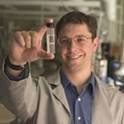
Aqueous-phase reforming of 10 wt% ethylene glycol solutions was studied at temperatures of 483 and 498 K over Pt-black and Pt supported on TiO2, Al2O3, carbon, SiO2, SiO2-Al2O3, ZrO2, CeO2, and ZnO. High activity for the production of H2 by aqueous-phase reforming was observed over Pt-black and over Pt supported on TiO2, carbon, and Al2O3 (i.e., turnover frequencies near 8-15 min-1 at 498 K); moderate catalytic activity for the production of hydrogen is demonstrated by Pt supported on SiO2-Al2O3 and ZrO2 (turnover frequencies near 5 min-1); and lower catalytic activity is exhibited by Pt supported on CeO2, ZnO, and SiO2 (H2 turnover frequencies lower than about 2 min-1). Pt supported on Al2O3, and to a lesser extent ZrO2, exhibits high selectivity for production of H2 and CO2 from aqueous-phase reforming of ethylene glycol. In contrast, Pt supported on carbon, TiO2, SiO2-Al2O3 and Pt-black produce measurable amounts of gaseous alkanes and liquid-phase compounds that would lead to alkanes at higher conversions (e.g., ethanol, acetic acid, acetaldehyde). The total rate of formation of these byproducts is about 1-3 min-1 at 498 K. An important bifunctional route for the formation of liquid-phase alkane-precursor compounds over less selective catalysts involves dehydration reactions on the catalyst support (or in the aqueous reforming solution) followed by hydrogenation reactions on Pt.
Available at: http://works.bepress.com/george_huber/38/
